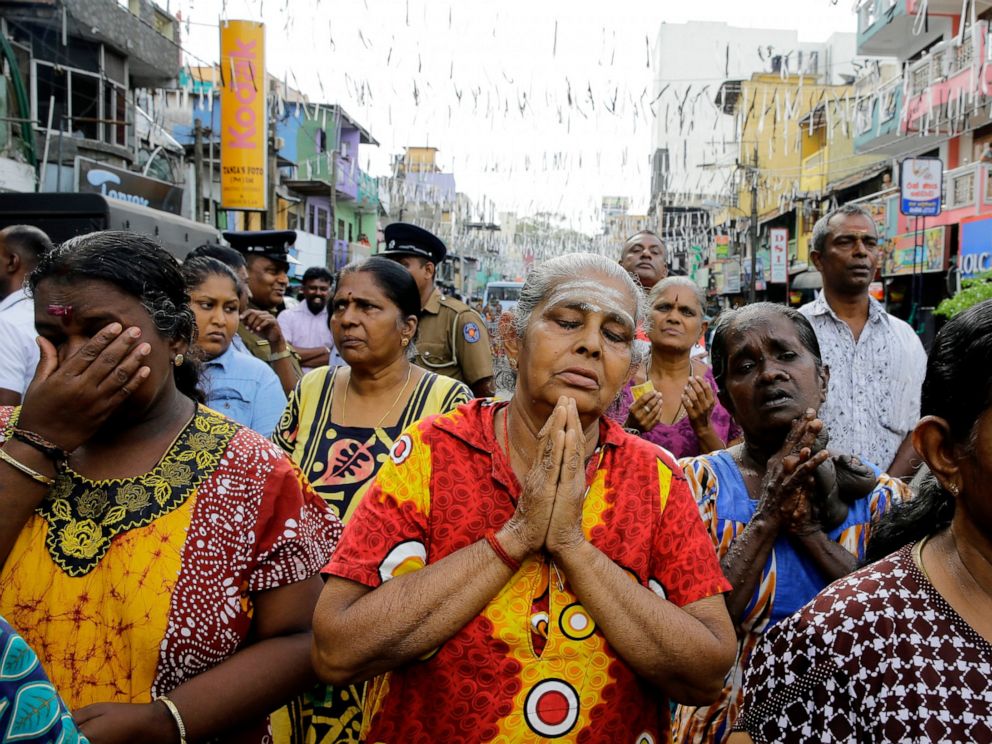Sri Lanka has barred face veils in the wake of the Easter bombings that killed hundreds of people at churches and high-end hotels.
Interested in Syria?
Sri Lankan President Maithripala Sirisena said that all kinds of face coverings, which are worn by some Muslim women, would be prohibited starting Monday — eight days after the island nation was hit by a wave of coordinated attacks. Sirisena, who used an emergency law to impose the ban, issued the directive “to ensure national security” and “public safety,” according to a press release from the president’s office on Sunday.
At least 253 people were killed and scores more were injured April 21 when near-simultaneous explosions took place at various locations across Sri Lanka, a largely Buddhist country off the southern tip of India. Dozens of people have been arrested in connection with the bombings, but authorities have warned that more suspects remain at large and are possibly armed with explosives.
Explosions erupted at three churches holding Easter services in Colombo, the capital, as well as Batticaloa and Negombo. Blasts also tore through three upscale hotels in Colombo, including some popular among Western tourists, according to Sri Lankan police.
Hours after the initial bombings, another explosion rang out at a housing complex in Dematagoda, a suburb on the outskirts of Colombo, police said.
Later that night, the Sri Lankan Air Force initiated a controlled explosion of a 6-foot-long pipe bomb detected on a road near Colombo International Airport, according to Sri Lanka Air Force spokesman Gihan Seneviratne.
A fourth hotel was targeted in a failed attack that day, according to Sri Lankan Prime Minister Ranil Wickremesinghe.
Most of the explosions were detonated by suicide bombers, according to Sri Lanka’s junior defense minister Ruwan Wijewardene.
Thirty-nine foreigners were among the dead, Wijewardene said. That includes at least four Americans, according to a U.S. official briefed on the investigation.
At least 46 children were among those killed, with the youngest just 18 months old, according to the United Nations Children’s Fund, which cited the Sri Lankan government.
According to Wijewardene, most of the suicide bombers were well-educated and financially independent, coming from middle- and upper-middle-class families. They had splintered away from a little-known local extremist Muslim group, National Towheed Jamaar, and another group that Wijewardene identified only as “JMI.” The former was earlier blamed for the deadly blasts by Sri Lanka’s health minister.
Australian Prime Minister Scott Morrison told reporters Fridaythe assailants in Sri Lanka had support from the Islamic State group, which has claimed responsibility for the deadly attacks.
The United States sent a team of FBI agents and military officials to help Sri Lankan authorities with the ongoing investigation. Intelligence units from Australia, India, the United Arab Emirates, the United Kingdom and the International Criminal Police Organization are also assisting.
Last week, the U.S. Department of Homeland Security and the FBI issued a joint intelligence bulletin expressing concern that the scope and scale of the Easter bombings could lead other would-be attackers to carry out plans of their own.
The U.S. Department of State has since raised the travel advisory for Sri Lanka to level three, the second-highest, and is urging Americans to reconsider traveling there.
ABC News’ Alexandra Faul, Ben Gittleson, Angus Hines, Dragana Jovanovic, James Longman, Josh Margolin, Elizabeth McLaughlin, James Meek, Kirit Radia, Bruno Roeber, Nadine Shubailat and Alex Stone contributed to this report.
Source: Read Full Article
